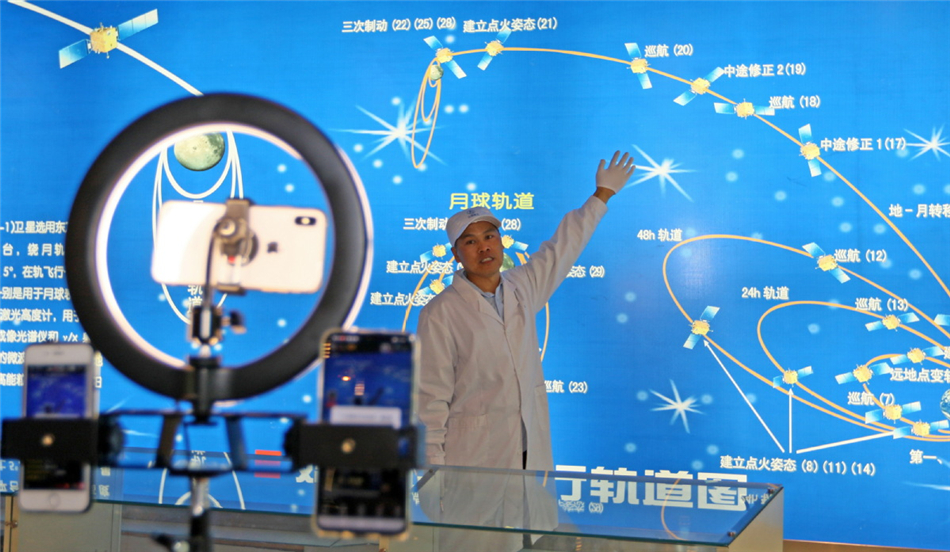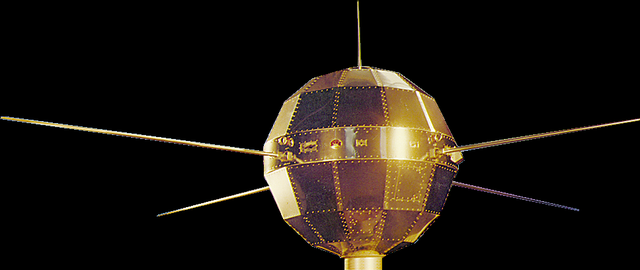Xi: Build 'great space power'

Scientist shows space achievements of the nation via a livestreaming program on Thursday to mark China Space Day.[Photo by Tang Ke / For China Daily]
President Xi Jinping extended greetings to elder scientists who participated in the country's first satellite program 50 years ago and said he expected space industry workers to learn from their predecessors' spirit and strive to build the nation into a stronger space power.
Xi, also general secretary of the Communist Party of China Central Committee and chairman of the Central Military Commission, wrote a letter in reply to some distinguished Chinese space scientists who participated in the Dongfanghong 1 mission half a century ago. He said new generations of space industry workers should learn and uphold the spirit of those who took part in the making of the nation's first nuclear weapon, ballistic missile and satellite.
A number of decorated space scientists, including Sun Jiadong and Wang Xiji, recently wrote the letter to Xi to express their expectations for China's space sector.
In his reply, Xi encouraged space industry professionals to overcome difficulties and hardships to achieve new heights in space science and technology.
"(You should) strive to strengthen and expand our space exploration and make our country a great space power as soon as possible," the president wrote.
Xi also wrote that he was in the village of Liangjiahe in Shaanxi province 50 years ago when he heard about the launch of China's first satellite. He told them he was very excited about the great news.
He recalled that the scientists' enterprise, diligence and perseverance inspired the whole nation at that time and exemplified the Chinese people's spirit of striving.
On April 24, 1970, the first Chinese satellite, Dongfanghong 1 or The East is Red 1, was carried aloft by China's first carrier rocket-Long March 1.
The mission made China the fifth nation to independently design, build and launch a satellite, after the Soviet Union, the United States, France and Japan. The 173-kilogram spacecraft worked 28 days before it ran out of power, but the satellite still travels in its orbit.
China has since sent over 500 spacecraft aloft and developed more than 20 models of carrier rockets.

Since 2016, China has set April 24 as the country's Space Day to mark the launch of Dongfanghong-1 into space on April 24, 1970.[Photo provided by the China Academy of Space Technology]
In 2016, China designated April 24 as China Space Day. Space authorities and major contractors organize events around the date each year to commemorate the nation's accomplishments in space. This year's events were mainly held by teleconferencing or livestreaming due to the impact of the novel coronavirus outbreak.
The annual China Space Conference is scheduled for Fujian province in the second half of the year, according to the China National Space Administration.
China is now a major player in the international space arena. The country carried out more space missions in 2019 than any other nation, with 32 successful orbital launches.
Also, on Friday, the China National Space Administration announced that the country's planetary exploration program has been named Tianwen, or Quest for Heavenly Truth.
The program was named after a long poem by famous ancient poet Qu Yuan of the Kingdom of Chu during the Warring States Period (475-221 BC). He is known for his patriotism and contributions to classical poetry and verses, especially through the poems of the Chu Ci anthology, also known as Songs of Chu.
The name represents the Chinese people's relentless pursuit of truth, the country's cultural inheritance of its understanding of nature and the universe, as well as unending explorations in science and technology, officials said.
The country's first Mars mission, which is expected to take place in coming months, was named Tianwen 1, the administration said.
It also released the planetary exploration program's emblem, which incorporates the elements of China, cooperation and capability in deep-space expeditions.
According to the administration, the country's first Martian probe will conduct scientific investigation of the Martian soil, geological structure, environment and atmosphere as well as water.
The robotic probe will consist of three parts-the orbiter, lander and rover.
The rover will have six wheels and four solar panels and will carry 13 scientific instruments. It will weigh more than 200 kilograms and will work about three months on the planet, said Sun Zezhou, the probe's chief designer at the China Academy of Space Technology.
Ye Peijian, a leading scientist in deep-space exploration at the academy, said the probe is expected to land on the Martian surface before July 2021.








